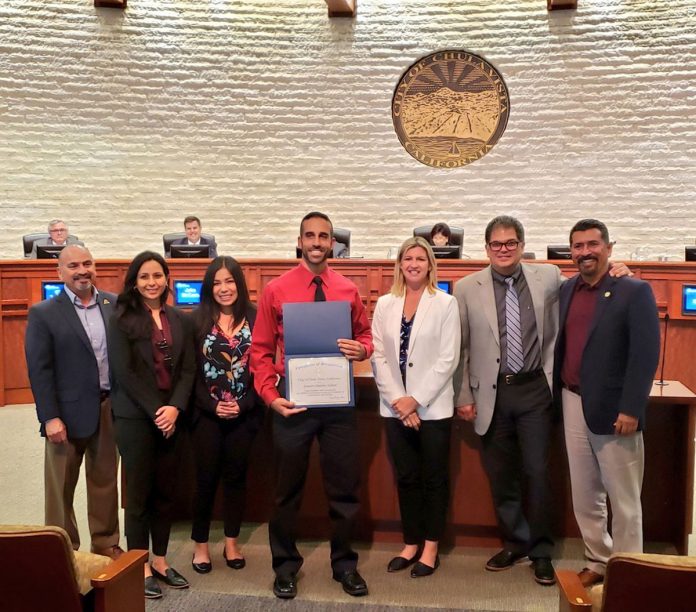
Earlier this month Feaster Charter School was recognized as a “Wellness Champion” by the Chula Vista Elementary School District during a Chula Vista City Council meeting.
The first-time award was given to three recipients, including the K-8 charter school located on Flower Street, which boasts a hydroponic greenhouse, garden, chicken coop, 13 sports teams and a variety of physical activities for both students and staff.
Chula Vista’s Hilltop Elementary school fifth-grade teacher Elvene Alcos and physical education teacher Doug Gorham were also recognized.
Heather Cruz, CVESD’s coordinator of physical education/health and wellness, oversees the district’s wellness committee, and said FCS was chosen because of its commitment to the district’s 20-plus page Wellness Policy, which was revamped in 2017.
“They have gone above and beyond what we would expect,” Cruz said. “They are definitely focused on improving health and wellness over at Feaster.”
The Wellness Policy includes both mandatory and encouraged guidelines such as proper nutrition and physical activity for school’s to follow and implement to promote healthy lifestyles.
Feaster Charter has not only followed the mandatory guidelines, but also the encouraged ones, according to Cruz, who referred to how the school has substituted bake-sale fundraisers with student-led performances to raise money.
“Anything getting away from selling unhealthy food,” Cruz said. “In the Wellness Policy we encourage schools to do that, but it’s not mandated, so they have taken it upon themselves to implement some of those different strategies.”
The school has also begun to schedule recess before student lunches – another policy recommendation – and have incorporated morning announcements which provide nutrition facts over the school intercom.
Cruz said wellness, to her, has wide ranging and long-term effects on what she refers to as the, “whole child.”
“When I think of wellness I think of being fit not just in your body, but in your mind,” she said. “Having a healthy mind and body is going to help them not only outside of school but with their academics as well.”
The man in charge of student’s bodies at Feaster Charter is Joseph Guglielmo, a physical education teacher who also serves as the school’s athletic director.
Guglielmo came to the school in 2014 and was given the task of restructuring the physical education department, transforming it from what he called a “glorified playtime.”
“For me, it’s been more about refocusing them on realizing the priority of things at a younger age and making it part of what they do every day,” Guglielmo said. “So that they don’t have to force themselves into it when they’re older, it’ll just be part of what they do.”
In addition to the 13 sports teams – which include fourth through eighth graders and start as early as two weeks into the school year – Feaster also has a morning run club and a club called girls on the run, encouraging more students to get involved in physical activity.
“A lot of those kids maybe hadn’t played sports,” Guglielmo said. “So we do try to give a lot of different opportunities to engage kids who wouldn’t join the normal sports teams.”
Middle school aged students also have fitness plans, which they manage throughout the year, and participate in four separate graded fitness tests.
Additionally, Guglielmo plans to incorporate nutrition-based food journals, so that students can track what they eat.
“(Students) see me eating my salads and my fruits and all that stuff, but I wanted to make them more aware of what they’re eating,” Guglielmo said. “I think one of the issues that I see is it’s no big deal to them. Like if I asked them what they ate today, half of them can’t tell me, they can’t even remember.”
The food habits of teachers and faculty are also considered, and educators at the school recently competed in a reality television-esque food competition in order to practice making healthy snacks.
“It was a fun way to give (teachers) some ideas, and also maybe discover some new ingredients and things that they can make quickly for snacks,” said Guglielmo, who helped judge the event. “We’re all so short on time, it’s just another way to support teacher wellness.”
The school has also incorporated a $5-per-session after-school workout program for teachers, something which has received financial support from the Parent Teacher Organization.
“Feaster’s basically doing a great job of setting an example,” Guglielmo said, “For what, when it comes to wellness, what schools could be and probably should be if they’re supported correctly.”














